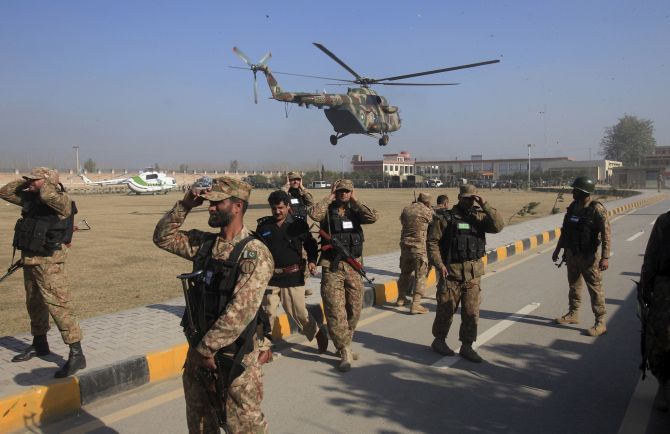
For the first time, Pakistani soldiers will undergo training at Russian military institutes after the two countries signed an agreement related to it, in a sign of further strengthening their defence ties amid Islamabad's increasingly uneasy relations with the United States.
The agreement was signed on Tuesday at the conclusion of the first meeting of Russia-Pakistan Joint Military Consultative Committee (JMCC) -- the highest forum of their defence collaboration, according to Pakistan's defence ministry.
"Both countries signed the Contract on Admission of Service Members of Pakistan in RF's (Russian Federation) Training Institutes," the ministry said.
The Russian side was led by Deputy Defence Minister Col Gen Alexander V Fomin who visited Pakistan from August 6–7 to attend the first session of Russia-Pakistan JMCC.
Lt Gen Zamir ul Hassan Shah (retd), Secretary Defence, led the Pakistani delegation during the JMCC meeting.
Prior to the inaugural meeting, held yesterday in the ministry of defence Rawalpindi, the visiting dignitary called on secretary defence and the defence minister.
The two sides discussed the present status of their defence relations with the aim to further strengthen, expand and diversify mutual cooperation.
During the inaugural session of the JMCC, both sides exchanged views on bilateral and major international issues including situation in the Middle East and Afghanistan, the ministry said.
A comprehensive issue based review was also carried out during which the two countries expressed satisfaction on the milestones achieved since the signing of ground breaking Agreement on Defence Cooperation in 2014. The two sides also held in depth discussions on avenues of future cooperation, the defence ministry said.
Col Gen Fomin also met Chairman Joint Chiefs of Staff Committee and the three services chiefs.
An Army spokesman said that Col Gen Fomin met Army Chief Gen Qamar Javed Bajwa and discussed the regional security situation and matters of mutual interest including enhancement of bilateral defence and security cooperation.
Fomin expressed his appreciation for Pakistan Army's achievements against terrorism and expressed requirement of greater cooperative and collaborative approach among global community to defeat extremism.
Pakistan's defence ties with Russia have moved past the bitter Cold War hostilities in recent years and the chill in the relations between Pakistan and the US has further pushed the country towards Russia and China.
Commenting on the agreement, Lt Gen Talat Masood (retd) said that the pact has opened new avenues of cooperation between the two countries and also showed that both sides are eager to further deepen their defence ties.
It was a 'very good move', he added.
Masood, who also served as the defence secretary, said that strategically Pakistan is trying to diversify its relations due to strain in its ties with the US, while Russia was also looking for a market to sell weapons.
"There is desire on both sides to improve ties and it is working well and the two countries are cooperating to increase economic, defence and political relations," he told PTI.
Defence and political analyst Dr Syed Farooq Hasnat told PTI that the agreement is an evident that Pakistan has come out of the US bloc.
"This agreement is a positive development and in days to come Pakistan and Russia will come more close to each other in the face of hostile attitude of the US," he said.
He said Pakistan has no conflict with Russia besides it is already close to China which is a good friend of Pakistan.
"In fact, President Donald Trump's policies towards Pakistan has forced it to find new alliances," he added.
Pakistan has shown eagerness to build military-to-military ties with Russia in recent years.
Earlier this year, the then foreign minister Khawaja Asif visited Moscow during which the two sides agreed to set up a commission to boost military cooperation.
Russia has over the past three years provided four Mi-35M combat and cargo helicopters to Pakistan and the militaries of the two countries also held joint drills codenamed 'Friendship'.
The drills stem from a defense cooperation agreement the two countries signed in 2014, lifting a long-running Russian embargo on arms sales to Pakistan.
Image only for representation. Photograph: Fayaz Aziz/Reuters










